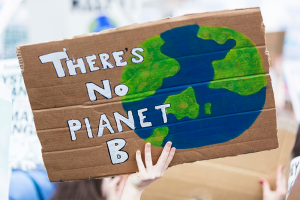News
-
Cambridge official exams results
Check how they went!
-
NOVA ESCOLA Cambridge School a MATARÓ
Incorporem Newlingua al nostre grup d'escoles
-
CASALS D'ESTIU 2025
Inscripcions obertes per a CAN SALA i HORTUS!
-
VIATGES I COLÒNIES EN ANGLÈS - ESTIU 2025
A Catalunya i a l’estranger!
November article
Thursday, 31 October 2019'Climate change and the house on fire' by E. Hearle
"I want you to act as if the house is on fire, because it is."
This quote was the closing line of a speech given by Greta Thunberg at the World Economic Forum in Switzerland earlier this year. She may only be 16 years old, but she has become famous all over the world for campaigning against climate change. She's given a number of powerful speeches since she first started her #FridaysForFuture movement last year and millions of young people have joined her on protests, with many children even walking out of school to take part.
At an important climate summit in New York in September, she addressed world leaders in a passionate speech to encourage them to do more to protect the planet. "The eyes of all future generations are upon you. And if you choose to fail us, we will never forgive you." The #FridaysForFuture movement began in August 2018, after Greta skipped school to sit in front of Swedish parliament to protest the lack of action on the climate crisis. After going viral, her campaign has inspired many more students movements across the world.
Thunberg isn't alone. Thousands of young people around the world are worried about their future and have joined her initiative, which consists of Friday meetings to raise awareness about this global concern. Generation Z young men and women are particularly present at these. They have a very clear mantra: it's time to act, and it has to be now.
During a speech in Tokyo at the end of last month, The Prince of Wales acknowledged Thunberg’s climate change campaign saying millions of young people are “desperately demanding urgent action to combat the emergency”. His comment came at the end of his two-day visit to Japan where he urged the UK and its Far East ally to work closely together to tackle the “existential threat” posed by climate change. “We will only be stronger, more secure and more prosperous if, as I hope and pray, we can work together ever more closely on tackling the dangerously existential threat of accelerating climate change.”
Another young, empowered woman also speaking out on this issue is Millie Bobby Brown (if you’ve seen “Stranger Things” she played Eleven). She’s only 15 but is using her position and influence as a household name to have her say. In an interview with Glamour magazine last month, she spoke about how climate change is, “literally the biggest issue of all. Without the world, nobody’s going to learn. We need to start taking care of our planet in the best way.” She is also UNICEF’s youngest-ever Goodwill Ambassador and given the number of people who look up to her, especially Gen Zrs, she is helping promote the message of change and how we must act now to risk not protecting our planet for future generations to come.
Singer Ellie Goulding has taken a different approach, asking young people to choose hope in the climate change battle and stay positive. The Brit-award winning artist has been a UN Environment Global Ambassador since 2017 and spoke at the One Young World summit in London last month, an event described as a global forum for young leaders. “You have the courage to imagine a future that puts our beautiful planet first.”
From encouraging her millions of fans to sign up for World Wildlife Fund's Earth Hour, to collaborating with jewellery designer Daisy London on a bracelet that funds environmental initiative, she is ambitiously versatile in her efforts for change. She even used an invitation to appear as a guest on Sesame Street to reach America's youngest television audience. When given a suggested song list, she took the opportunity to ask if she could sing about something related to climate change instead. When Ellie Goulding uses her voice, people listen," says Kathy Calvin, President and CEO of United Nations Foundation. "She is using her platform to raise awareness about the need to safeguard our planet and meet the Sustainable Development Goals.”
Some people fear awareness and for the climate has gone one step too far though. Climate anxiety – like climate depression or climate rage – has been around for decades but according to the Climate Psychology Alliance (CPA), the "massive public awakening" on climate change has brought it more into focus." The American Psychological Association describes climate anxiety as "a chronic fear of environmental doom" and that the condition manifests itself in a number of ways - grief, rage, depression and hopelessness. Others argue that it's not a mental illness and that if anything, it's a sign of good mental health because you are engaging with what's going on.
Engaging in the discussion is most certainly positive and at Cambridge School teachers and students have been trying out ways to reduce our “ELT Footprint”. With Global Climate Change Week being in October, many English language teaching books keep this in mind with chapters on the environment being designed to be taught in the first few weeks of the academic year. It’s incredible how interested students are in what was formerly considered a fairly boring topic. I recently taught a class on how the impact of humans on the planet means we are entering a new geological epoch called the Anthropocene. We read about how millions of years from now, our geological footprint will be visible in radioactive material from atomic bomb tests, plastic pollution, increased carbon dioxide levels and human-induced mass extinction. Evidence of human life on earth will be like the evidence of dinosaurs on earth today. You could have heard a penny drop in this, usually quite chatty, group of young adults. It became apparent how relevant this is to both our lives today and that of our unborn children and how informed and mindful young people are on the matter. Discussions were passionate with teenagers as young as 15 and 16 fiercely urging adults twice their age to make changes to their daily lives to be the small cog in the big wheel of change.










 Tel. 93 655 05 58
Tel. 93 655 05 58 Enviar WhatsApp
Enviar WhatsApp



![[...]](https://www.cambridgeschool.com/xtra/imgs/loading.gif)